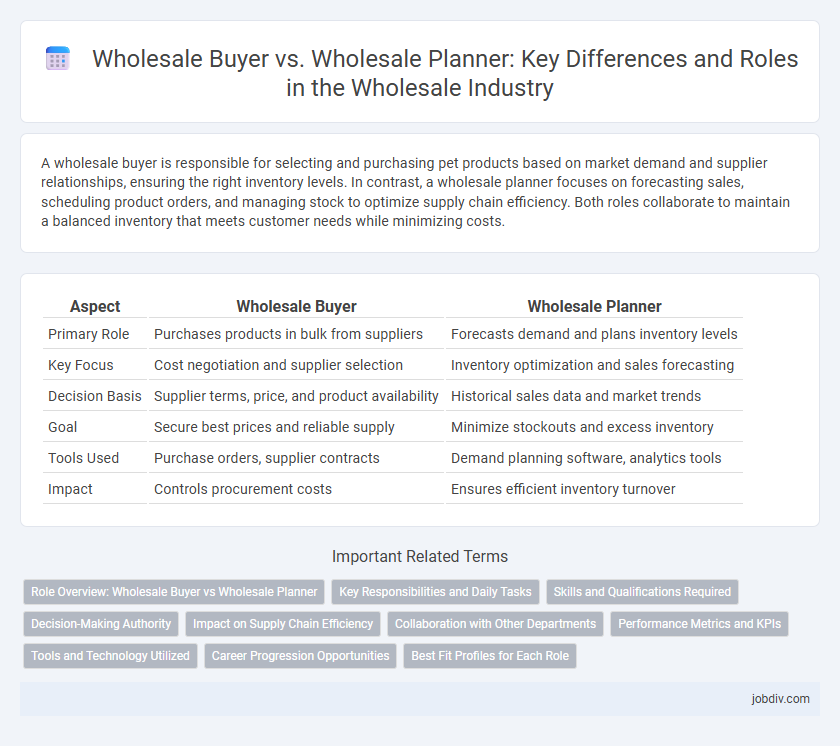A wholesale buyer is responsible for selecting and purchasing pet products based on market demand and supplier relationships, ensuring the right inventory levels. In contrast, a wholesale planner focuses on forecasting sales, scheduling product orders, and managing stock to optimize supply chain efficiency. Both roles collaborate to maintain a balanced inventory that meets customer needs while minimizing costs.
Table of Comparison
| Aspect | Wholesale Buyer | Wholesale Planner |
|---|---|---|
| Primary Role | Purchases products in bulk from suppliers | Forecasts demand and plans inventory levels |
| Key Focus | Cost negotiation and supplier selection | Inventory optimization and sales forecasting |
| Decision Basis | Supplier terms, price, and product availability | Historical sales data and market trends |
| Goal | Secure best prices and reliable supply | Minimize stockouts and excess inventory |
| Tools Used | Purchase orders, supplier contracts | Demand planning software, analytics tools |
| Impact | Controls procurement costs | Ensures efficient inventory turnover |
Role Overview: Wholesale Buyer vs Wholesale Planner
The Wholesale Buyer is responsible for selecting and purchasing products that meet market demand and company profitability goals, focusing on supplier negotiation and inventory levels. The Wholesale Planner manages inventory forecasting, demand planning, and supply chain coordination to ensure product availability aligns with sales targets and operational efficiency. Both roles collaborate to optimize product assortment and streamline the procurement-to-delivery process in wholesale operations.
Key Responsibilities and Daily Tasks
A Wholesale Buyer focuses on selecting and purchasing products that meet market demand and budget constraints, negotiating with suppliers, and managing inventory levels to optimize profitability. The Wholesale Planner concentrates on forecasting sales, planning stock allocations, and coordinating production schedules to ensure product availability aligns with seasonal trends and customer requirements. Both roles require close collaboration to balance supply and demand, streamline the supply chain, and maximize revenue growth.
Skills and Qualifications Required
Wholesale buyers require strong negotiation skills, market analysis capabilities, and an understanding of product trends to secure the best deals and maintain profitable inventory levels. Wholesale planners must possess expertise in demand forecasting, supply chain management, and inventory optimization to ensure seamless product availability and minimize stockouts. Both roles demand analytical thinking, attention to detail, and proficiency in relevant software tools such as ERP systems and data analytics platforms.
Decision-Making Authority
Wholesale Buyers primarily possess decision-making authority related to product selection, vendor negotiation, and purchase approval, ensuring optimal inventory at competitive prices. Wholesale Planners focus on demand forecasting, inventory allocation, and sales trend analysis, guiding strategic decisions for stock levels and product mix. The distinction lies in Buyers managing transactional vendor interactions, while Planners influence supply chain and sales strategy decisions.
Impact on Supply Chain Efficiency
Wholesale buyers ensure efficient procurement by selecting the right products at optimal prices, directly influencing inventory levels and reducing stockouts. Wholesale planners analyze demand forecasts and coordinate production schedules to optimize stock turnover and minimize excess inventory. Their combined efforts streamline the supply chain, enhancing overall efficiency and reducing operational costs.
Collaboration with Other Departments
Wholesale buyers coordinate closely with sales, marketing, and inventory departments to align product selection with market demand and promotional strategies. Wholesale planners collaborate with finance, supply chain, and logistics teams to create accurate forecasts and optimize inventory levels. Effective communication between buyers and planners ensures synchronized purchasing decisions and streamlined operations across departments.
Performance Metrics and KPIs
Wholesale buyers focus on KPIs such as purchase price variance, inventory turnover, and supplier lead time to optimize cost-efficiency and stock levels. Wholesale planners prioritize performance metrics like forecast accuracy, order fulfillment rate, and demand planning effectiveness to ensure supply chain reliability and customer satisfaction. Both roles rely on data-driven insights to drive profitability and streamline operations within wholesale distribution.
Tools and Technology Utilized
Wholesale buyers leverage advanced procurement software and data analytics tools to efficiently source products, negotiate prices, and manage supplier relationships, ensuring optimal inventory levels. Wholesale planners utilize sophisticated demand forecasting platforms and inventory management systems, incorporating AI and machine learning technologies to predict market trends and optimize stock distribution. Both roles rely heavily on integrated Enterprise Resource Planning (ERP) systems for real-time data access, seamless communication, and streamlined supply chain operations.
Career Progression Opportunities
Wholesale Buyers focus on selecting and purchasing products that meet market demand, developing expertise in supplier negotiation and inventory turnover analysis to advance into senior procurement roles or supply chain management positions. Wholesale Planners specialize in forecasting, demand planning, and coordinating stock levels, with career progression leading to demand planning manager or operations director roles emphasizing strategic inventory optimization. Both career paths offer growth through enhanced analytical skills and leadership in supply chain efficiency, with opportunities to transition into cross-functional roles within retail and distribution sectors.
Best Fit Profiles for Each Role
Wholesale buyers excel in analytical decision-making, supplier negotiation, and inventory management, making them the best fit for roles requiring strong market research and cost optimization skills. Wholesale planners thrive in demand forecasting, supply chain coordination, and production scheduling, fitting roles centered on aligning stock levels with sales trends to minimize shortages and overstocks. The best-fit profile for buyers includes strong negotiation and market insight, while planners require expertise in data analytics and logistical planning.
Wholesale Buyer vs Wholesale Planner Infographic

 jobdiv.com
jobdiv.com